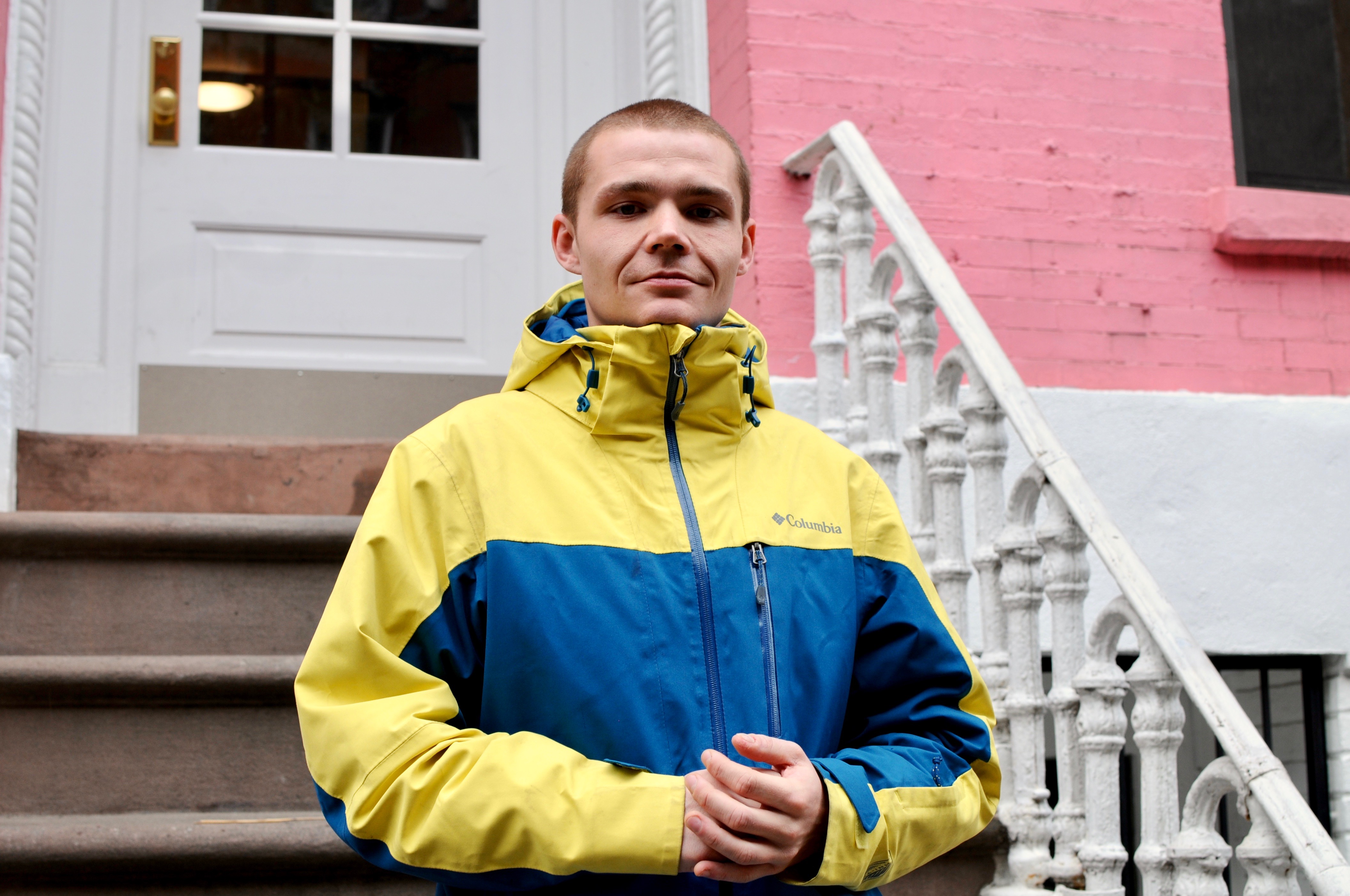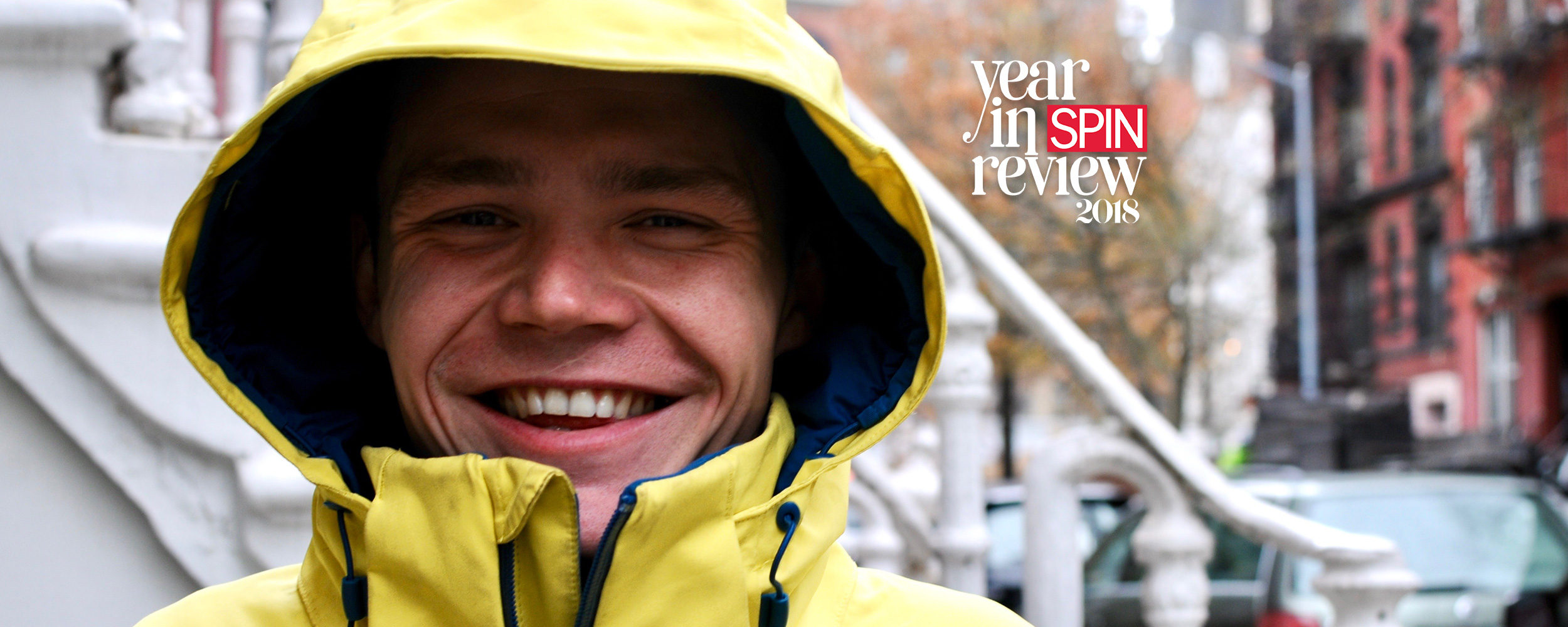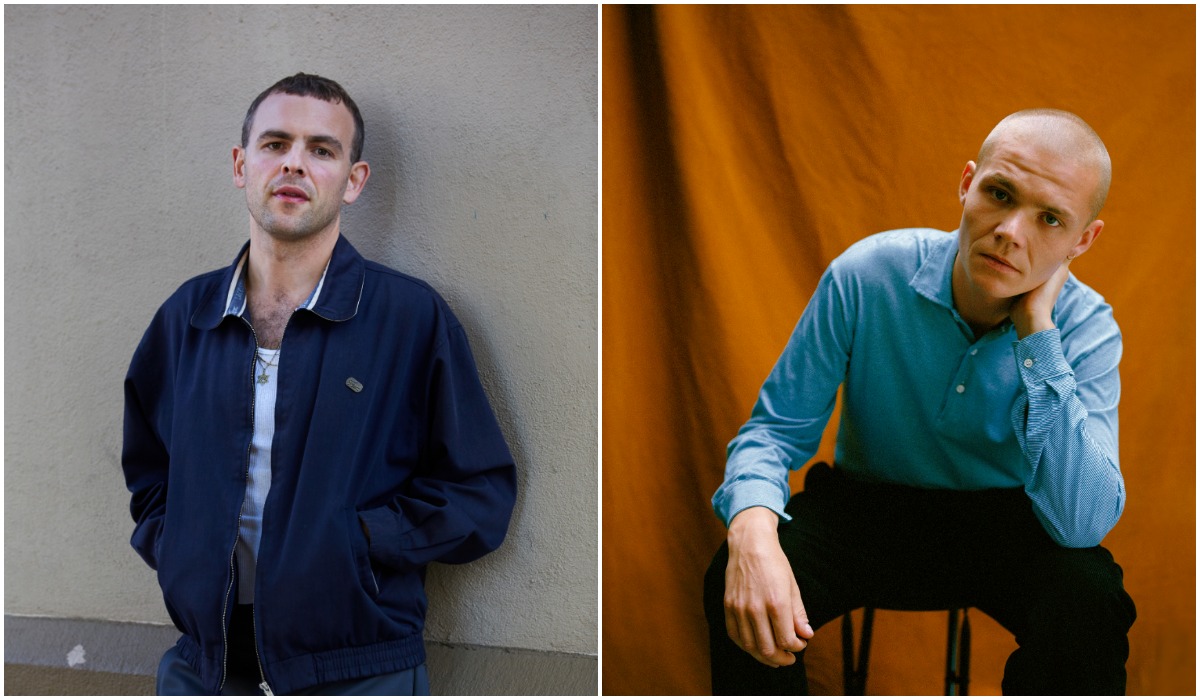Will Westerman has already had too much caffeine, but because I’ve just arrived, ostensibly to chat with him over coffee about his breakout year as a musician, he feels obliged to drink something. At the counter of Southern Cross, a cramped “Aussie and Argentinian”-themed cafe in Manhattan’s East Village, he grabs what he terms “one of these weird fizzy drinks”: a bottled yerba mate soda. By now, the West London-based singer-songwriter has no doubt patronized his fair share of New York City businesses like these, skirting the edges of self-parody. He arrived in the city, and the country, three days ago. His British manager, publicist, and keyboard player are among the crew filling the cafe, thumbing through their phones to sketch out sightseeing plans. They are all here to help facilitate the first American shows of Westerman’s short career: one in New York, one in Los Angeles.
Looking up toward the eaves of Southern Cross, Westerman recalls that, not long ago, he was working in places like this one. “I worked in a frozen yogurt shop, too, and bars,” he says. “I tend to not last very long at jobs. I have ADHD, so I’m bad at remembering things. Taking orders is my worst nightmare.”
If he’s still taking orders, he won’t have to for much longer. Westerman’s erudite and emotionally generous music, released using his last name as a mononym, has seen an unexpected uptick in public interest this year, thanks largely to “Confirmation,” an expertly crafted bit of smooth and minimal electropop with a beatific chorus that’s impossible to shake. Released in March as a standalone single via the small Blue Flowers label, “Confirmation” stood out thanks to Westerman’s tart, jazzy guitar accompaniment, spelling out harmonies more redolent of Joni Mitchell’s Hejira or John Martyn’s Solid Air than the modern R&B favored by contemporaries like The xx and James Blake. (People frequently compare Westerman’s voice to Arthur Russell’s, much to his chagrin—he only heard the cellist’s music for the first time recently.)
Though the song received little formal promotion, it began receiving rapturous attention from critics—adulation reminiscent of a bygone era of music journalism, when one positive Pitchfork review could be the beginning of a new life for an independent artist. Westerman has since released a trickle of like-minded singles and an EP, but not yet a full-length album. Still, “Confirmation” already has him appearing on several publications’ year-end lists.
Still, it’s unclear whether that excitement will grow beyond the small but spirited fanbase Westerman is currently cultivating, but his first trip to the States bodes well. After the coffee shop, we head to a nearby record store, where we discuss our mutual appreciation of Steely Dan and the Blue Nile. (He seems to favor embryonic works over pristine masterpieces, preferring Dan’s third album Pretzel Logic and the Blue Nile’s debut A Walk Across the Rooftops over each band’s more widely-touted records.) The following evening, he takes the stage at Elsewhere, in an intimate neon-lit room at the venue in Brooklyn, and plays a brief but remarkable set for a sold-out crowd. Onstage with a keyboardist and bassist, his arrangements are more pliable than on the recordings, allowing for thrilling moments of spontaneity. His guitar playing is idiosyncratic and expressive, and his voice is immaculate, almost uncannily so. People in the room seem to know the words to multiple songs, not just “Confirmation,” which Westerman saves somewhat coyly for the encore. Between songs, he grins bashfully at the audience.
At the upstairs bar after the show, Westerman seems both pleased and a little overwhelmed. Without the benefit of hindsight, it’s impossible to know for sure, but the night has the feeling of an archetypal scene in a musical biopic: the star’s breakthrough club performance, albeit in the smallest section of an elaborate multistage venue, where well-established indie-punks Iceage are playing to a markedly bigger crowd down the hall. Westerman scours the premises for a Sharpie to sign records, and a flurry of people approach him with praise, including the venue’s owner, pontificating about his “bright future.” A young woman says hello, lamenting that they hadn’t been able to get together on Sunday for a coffee meeting. Westerman nods, apologizes, and laughs.
“I have no idea who that is,” he remarks as she walks away. “This kind of thing has been happening a lot in New York.”
[featuredStoryParallax id=”313317″ thumb=”https://static.spin.com/files/2018/12/DSC_7454-2-1544738355-300×199.jpg”]
In person, Westerman is quiet and perspicacious, far from the image of the swaggering star on the rise. He revises his speech in real time, often beginning a sentence several different ways before arriving at the most crystalline form of the thought. It’s similar to the writing process behind the songs that brought him newfound recognition this year, which derive unusual power from their spartan aesthetic. Westerman describes composing as a “process of elimination—a whittling down.” He mimes the deletion of an instrument track with a mouse click. “There’s always more than you would hear, and then I kind of strip it out.” Eventually, the accompaniment finds its shapes and patterns through Westerman’s instinctual intolerance for “muddiness” and clutter.
Recently, he’s worked exclusively in collaboration with Bullion, the UK-famous DJ and producer born Nathan Jenkins, whom Westerman met through his former manager. Bullion helped build and refine minimal arrangements for Westerman’s Call and Response EP from last year, “Confirmation” and its follow-up singles, and the four songs on November’s Ark EP, all of which Westerman originally composed on acoustic guitar. They record at Bullion’s home in Portugal in focused, several-day-long sessions. “I didn’t really know how to use recording software really and I still don’t,” Westerman admits. “I was just looking for someone to help me make a record, and I sent Nathan these voice memos I’d done, and he liked one of them. It was kind of just luck, because I didn’t know what he was. It was really easy to work together.”
Though Westerman is new to American audiences, he has been active in the London music scene for several years. He’s been writing music for roughly a decade, starting shortly after he taught himself the guitar by imitating “indie rock-y” kind of bands like Kings of Leon and the Gaslight Anthem. Over time, he graduated to a loose group that he jokily terms the “classic songsmiths,” including Nick Drake, Leonard Cohen, and Neil Young. In his early years as a university philosophy student, he became an adept fingerpicker, writing lonesome songs with a clearer relationship to this canon than the music he’s making now.
After graduation, he began to work as a tutor in philosophy and English literature, a job he held until about a year and a half ago. “Mostly I’m interested in ethics,” he explains, before giving the sort of enthusiastic primer his students may have enjoyed. “I like Greek philosophy and a lot of pre-Christian ethical systems because the whole focus of why you should behave in a certain way has nothing to do with fear of judgment from some kind of omnipotent god. Aristotle’s virtue ethics is really applicable today for me. It’s a really cool thing, like, ‘Man, this could actually work.’ It’s hard, and I wouldn’t say that I manage to do it particularly. Currently, with the world so fractured and with different religious dogmas, I just found that a very compelling thing to study and think about.”
I tell him that the ideas he’s describing remind me of themes in his music: “Confirmation” explores a mental prairie of indecision and self-doubt; “Edison” and “Easy Money” contemplate the personal and societal consequences of ambition and privilege. In all these songs, self-betterment along prescriptive lines seems like a Sisyphean task. “I was thinking a lot about power at that time,” he says, discussing “Edison,” which comes across like his take on funky, Dire Straits-ish bar rock. “I was really disillusioned with the morally dubious people who are in power right now, or maybe they always have been. I was thinking about ambition and megalomania and also applying it to myself, like, ‘What is the point of these songs that I’m writing?’” “Easy Money,” he adds simply, is about “unfairness,” economic and otherwise.
Songs like these evince Westerman’s drastic metamorphosis as a songwriter over the last year. The Call and Response EP was a labor of love for Westerman, serving as a bridge between his earlier acoustic recordings and his recent experiments in skeletal sophistipop. Following a tepid response to the project, and ensuing guilt about disappointing his label, he lost his faith in his music for a while, and considered walking away from it altogether. “I kind of had a really bad time for a bit,” he says, with hesitation. “The process of putting out ‘Confirmation’ when I wasn’t really sure that I wanted to do this anymore—at that point, it did seem like it was going to be humiliating. But I did it anyway. It can be quite easy to be self-conscious.”
Later, he revises the point, paring it down to its essence, just as he does with the radically reduced arrangements of his songs: “I guess it takes a certain degree of self-assurance to play less.”
Perhaps the surprise success of “Confirmation” helped Westerman with that self-assurance. The Ark EP, his most recent release, is more economical than ever, particularly in its lyrics, which favor distilled expression over crypticness or redundancy. “It’s about calling your own bluff,” he says. “Like saying, ‘That’s not relevant, I don’t really mean that, that’s some strange insecurity.’ Then you try to cut to the core of what you were trying to emote.”
Westerman plans to begin recording his first full-length in January, working with Bullion in a rented house on Portugal’s Faro coast. He hopes to bring in “really good live players” to create a more organic sound, and to convey a sense of the setting. “The lo-fi stuff has been more out of necessity than out of choice,” he says. “I’m a bit of a way off from making my orchestral album. The new record is not going to be a total departure. But it will be more of a balance, where I’m able to pick and choose more. I’ve used software because I didn’t have access to this other thing.”
The string section can wait. For now, he’s just excited about his replacing his previous bassist—a portamentoing synth patch, rather convincingly mimicking a fretless player—with an actual human.

Back at the show’s afterparty, I’m approached by a jovial gray-haired man whom I’d met briefly the day before. I learn that this is Westerman’s father, Piers, who traveled with his son to the States to see his debut here. At our first meeting, he’d led me to believe he was affiliated with Westerman’s label. “I’ve been telling people all sorts of things,” he explains, grinning. Piers’s air of charming mischief is surpassed only by his obvious pride as a dad. He archly, and repeatedly, offers me “scoops” about his son that are sometimes mundane and tongue-in-cheek, but also somehow revealing of Will Westerman the person—the young man who seemed to appear from nowhere, riding these dual waves of talent and buzz. For instance, Piers says it took some convincing from dad for Westerman to appreciate Steely Dan, a band whose t-shirt Will wears in a recent promotional photo. (Plenty of millennial Dan fans can relate.) Still, their tastes diverge: Piers’s favorite album is Gaucho.
The bar is now packed with fans and industry types, here to support Will. And above all, Piers emphasizes how all of this was unfathomable for his son less than a year ago. “When ‘Confirmation’ came out, the phone started ringing off the hook, and not from London—-from America,” he says. He remembers when Will first played the song for him on acoustic guitar, when it wasn’t yet his signature number, when he wasn’t even sure he’d release it at all. After telling the story, Piers pauses and makes a performative survey of the crowd, as if to say, and now look.
Find more from Spin’s 2018 Year in Review here.





